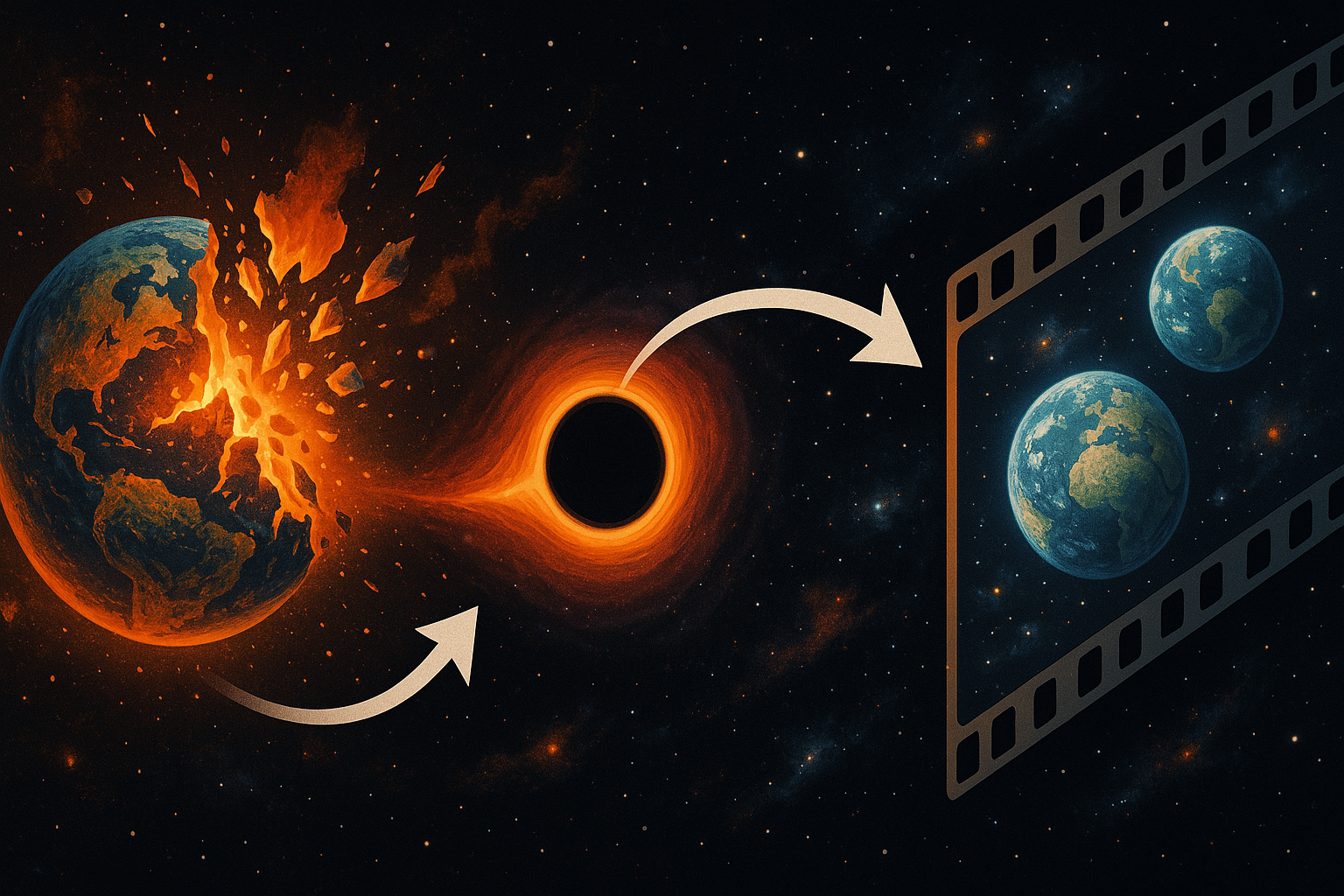The Cosmic Reel: Determinism, Multiverse, and the Eternal Reshuffle
Imagine the universe as a movie—one that is already filmed, its events set in stone, unalterable and immutable. Every moment, from the birth of stars to the last breath of a dying civilization, every action, every invention, every death and birth has already been scripted, playing out in an unbroken sequence. In this scenario, free will is an illusion; every thought, action, and reaction is merely the unfolding of a cosmic script, preordained from the very first frame of existence.
This notion aligns with the concept of determinism, the idea that every event in the universe is the inevitable consequence of preceding events. Just as a filmstrip does not change once produced, our reality unfolds according to the laws of physics, unbending and absolute.
The Death and Rebirth of a Universe
Now, let’s push this deterministic model a step further. We understand that matter and energy cannot be destroyed—only transformed. When a planet dies, when a star goes supernova, or when galaxies collide, the energy disperses into space. But what happens when the collapse is absolute? What if a cosmic event such as a black hole does not simply consume matter, but processes it in ways we can barely comprehend?
A black hole, a region of spacetime where gravity is so intense that not even light can escape, might serve as the ultimate cosmic reset button. When a dying star collapses into a singularity, it is not merely vanishing; its essence—its energy, information, and structure—is being absorbed, compressed, and possibly restructured.
When massive bodies like planets or stars end their lives (through explosions, for instance), enormous amounts of energy are released. Black holes, with their extreme gravitational pull, are already thought to play a role in the conservation and transformation of energy (such as the Hawking radiation and the debates around the information paradox).
The Multiverse Hypothesis: A Movie Remixed
If the universe is a deterministic movie, then what happens when the film reel is pulled apart, melted down, and recast into a new reel? Imagine a cosmic process in which the entirety of an expired universe—its atoms, laws, and history—is funneled through a black hole and ejected into another dimension, another iteration of existence. But here’s the twist: the elements remain, but the order is randomized. The film has been rewritten, its scenes rearranged, its characters reshuffled. Each new “movie” might start with a different set of initial conditions—a different cast of characters. Connecting the conservation laws of physics that matter and energy cannot be created or destroyed, only transformed with the potential for multiple, diverse universes.
Imagine this:
1. Adam and Eve Under a Different Name
In one version of the universe, the first recorded humans might not be called Adam and Eve. Perhaps they are Amon and Elara, originating not from the Middle East, but from a lush, untouched valley in what we call present-day Siberia. The core story remains the same, but the characters and locations shift, much like a remade film set in a different culture.
2. Ancient Egypt in the Americas
What if, in another iteration of reality, the powerful and advanced Egyptian civilization arose in what we now call America? The Mississippi River could have been their Nile, and pyramids might dot the landscapes of the Midwest. The Olmecs and Mayans already had pyramid-building traditions—maybe in another universe, their cultures were the dominant global force instead of Rome or Greece.
3. The Roman Empire Never Fell
In a different version of history, the Roman Empire might never have collapsed. Instead of the Dark Ages, technological progress continued, leading to space exploration centuries earlier. Perhaps by 2024 in that universe, humanity is colonizing Mars, not just sending rovers.
This aligns with the multiverse theory, which suggests that infinite universes exist, each with its own set of physical laws, variables, and histories. What if each universe is merely the result of a previous universe’s ‘death’—a rebirth through entropy, reshuffling the fundamental particles of existence into a new configuration?
The laws of thermodynamics support this concept. Absolute entropy dictates that systems tend toward disorder, and what is more chaotic than a universe expelled through a singularity? The randomness of this new universe means it can be fundamentally similar or vastly different from the previous one, a cosmic dice roll.
Free Will and the Illusion of Choice
If all universes are deterministic in nature—each a movie playing out without deviation—then the idea of free will remains a comforting mirage. Every thought we have, every action we take, is merely the next frame in the film, an unavoidable sequence dictated by physics. However, the destruction and recomposition of universes allow for infinite possibilities—new actors, different scripts, and alternate versions of reality, all playing out in a grand cosmic cinema.
The Eternal Film Loop
The question then becomes: Is there an original film? Or has this process been occurring infinitely, an eternal cycle of universes collapsing, reshuffling, and reemerging? If so, perhaps the multiverse is not just an array of parallel realities but a continuous, evolving sequence of re-edited films—each one a variation on a theme, forever changing, forever repeating.
In this grand projection of existence, we are but actors performing our roles, unaware that the script was finalized eons ago. Yet, even as our universe reaches its inevitable conclusion, its essence will be absorbed, processed, and transformed, ready to be projected anew in another dimension, another existence. The cosmic reel spins on, and the movie never truly ends.
If you have made it this far, I thank you for reading. This theory was developed with insights and refinements from ChatGPT.
